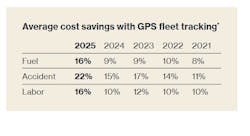More fleets turn to GPS tech to bring down costs, Verizon Connect report finds
Verizon Connect’s fifth annual Fleet Technology Trends Report has found that fleets have increased their use of technology across the past five years, particularly GPS tracking, to keep up with rising costs and evolving regulations.
“As fleet management continues to evolve, it's clear that technology is more than just an investment, it's a critical driver of efficiency, safety, and sustainability," said Peter Mitchell, general manager, Verizon Connect. "The findings from this year's Fleet Technology Trends Report highlight a strong commitment across industries to embracing fleet technology, with GPS tracking and in-cab video solutions consistently delivering measurable results.”
The study was based on responses from 543 fleet management professionals, with most of the respondents (77%) reporting that rising costs were their top concern. This has been the case since Verizon Connect first began its Fleet Technology Trends report. Additionally, 43% of respondents rated increased regulations as their top concern, and roughly one third said that competitive pressure was their most important issue. Concern over both of these topics has only risen since the report began in 2021.
Read more: Technicians growing more comfortable with advanced diagnostic tools, Anyline survey says
To manage these issues, the study reported that 4 out of 5 respondents have used fleet technology for the past five consecutive years. Respondents used GPS tracking technology most prevalently at 69%, with 62% reporting improved efficiency and almost half reporting fewer harsh driving or speeding events while using it. Additionally, the report found that 47% of respondents achieved a positive ROI from GPS fleet tracking in less than a year, while asset tracking and field service/workforce management solutions experienced a 7% increase in a positive ROI in less than a year.
As for this technology's specific ability to reduce costs, Verizon Connect found that fleets using GPS tracking were able to increase their savings significantly in three key areas: Fuel, accident repair, and labor. From 2021 to 2025, the report found fleets using GPS tracking were able to double their fuel savings to 16% as well as their accident savings to 22%. Labor cost savings increased as well, rising from 10% in 2021 to 16% in 2025.
Additionally, the report found that across the various industries surveyed, including transportation; construction, field services, and utilities; and government, fleets were consistently able to reduce their maintenance costs by 16% with GPS tracking. According to the company, this impact is due to how fleet management technology can apply AI and machine learning to plan maintenance intervals based on a vehicle's needs, reducing serious issues and overall downtime.
This decrease in maintenance and accident costs corresponded with an increase in safety for fleets using GPS tracking and in-cab video, with 57% of survey respondents reporting improved driver safety due to the former, and 68% stating the latter helped reduce distracted driving and lower accident costs.
But such fleet technology was not only beneficial for safety and cost reduction. According to Verizon Connect, GPS tracking helped fleets optimize their electric vehicle integration and usage, primarily to improve vehicle visibility and daily operations efficiency. 30% of respondents also reported using GPS tracking to reduce maintenance costs, and 19% used the technology to increase battery status visibility.
About the Author

Alex Keenan
Alex Keenan is an Associate Editor for Fleet Maintenance magazine. She has written on a variety of topics for the past several years and recently joined the transportation industry, reviewing content covering technician challenges and breaking industry news. She holds a bachelor's degree in English from Colorado State University in Fort Collins, Colorado.



